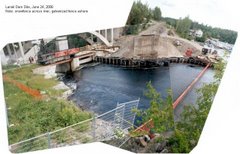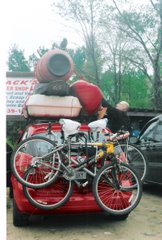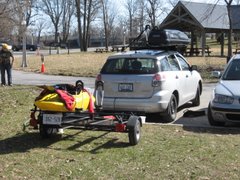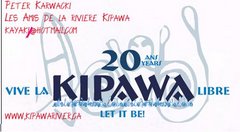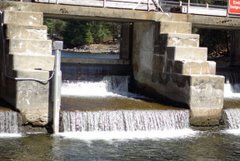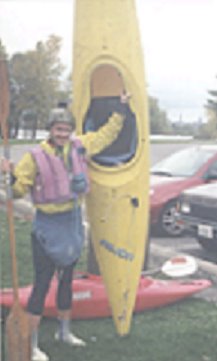Here is the ongoing discussion:
Whitewater Ontario wants a hydroelectric diversion put in!!!!! Email them how you feel about this. Let's Dam WO, AND NOT THE GULL RIVER.
Welcome to Whitewater Ontario
Whitewater Ontario
WHITEWATERONTARIO.CA
Share
Jeff McColl, Jon Ward and 2 others like this.
Wayne Donison Not a true statement.
12 hrs
Billy Harris What should it say?
10 hrs
Robert Koloshuk It's a true statement unless the advocacy committee presents a resounding 'NO' at the board meeting. So if it's not a true statement than prove it Wayne!
1 · 11 hrs
Billy Harris Hold on Wayne. Do you want this project to go through?
11 hrs
Billy Harris I don't care what carrot or sweetener a corporation slathered on this it's a corp wanting to put a hydro electric project in and kayakers say no to that. Leave the gull b!
11 hrs
Kevin Maggs Ok, So Wayne is on the Volunteer W/O Board. Wayne who was part of the fight to save the Kipawa, Ran the Rally at least one year. Was part of that big rally in Ottawa to fight against the dam that threatened the entire Kipawa watershed. You know the one that Esprit organized? Maybe you missed it. Has attended more HOHW events than you have Billy and he lives more than 45 minutes away. As part of W/O has the negotiated paddler access to various Marmora area rivers. Was the main one responsible for saving access to the lower Irvine with a Landowner agreement. Before being on W/O spent hours on a committee to remove a dam on the Grand, then hours fighting for access to the Grand when a developer wanted to close access. I don't know but I kind of think if he is on the case, things might not be so dire. It's not like he'd rather be paddling than spending hours in meetings about yet another dam or access issue. Personally I don't care about the Gull, It's kind of an artificial river so I'll leave it up to people to fight it out but Wayne's credentials are solid.
5 · 3 hrs
Billy Harris Wayne's credentials are solid, so who is on side for this project?
2 hrs
Gary George I don't have any concerns about Wayne Donison or his credibility. My trust in the WO process doesn't go much beyond that. I have been the well intended hard working unassailable tireless guy deflecting dissent and encouraging people and advocating on behalf of the two worlds. I know how that often turns out.
2 · 2 hrs
Wayne Donison Simple statement, as I have said to many people many times. The committee position on behalf of paddlers has always been that we prefer NO diversion...of course. The concern was the risk of losing paddler access below Whitehorse Falls...since we don't own that land. The survey did not present this position as clearly as I would have liked.
1 · 2 hrs
Robert Koloshuk I agree with Kevin that Wayne's track record is exceptional. But there's this conversation that Wayne is stuck in the middle of, and it's a conversation between people who are totally misguided and people who care about the river and realize that it's totally ridiculous to sign MOU1. The fight should be for access if there is a fight at all, based on what we know about OPGC and the project. I'm sorry, but lots of great paddlers do care about the Gull (a lot), and nobody has presented a case where signing OPGC's MOU1 can be worth it, even if there were a fight for access, which quite frankly, its fairly obvious there won't be...
2 hrs
Gary George So here we have the Countries most famous and celebrated Slalom course, the second most favoured reliable whitewater in the Province, the home of several World Cup competitions and the recent venue of the Pan Am`s and we`re concerned that a small hydro operator will withdraw access if we don`t play ball and give up water and functionality?
1 · 2 hrs · Edited
Robert Koloshuk That's right Gary... It's ludicrous... And several people within the WO advocacy committee have indicated that they would prefer if the river were diverted to keep the levels lower for them sometimes, and because OPGC will pay off WO to the tune of maybe $10,000 per annum.....
2 hrs
Gary George WO has always operated in a money vaccum, proposals have been made in the past to re-finance or sell the Preserve in order to fulfill budget needs. The budget needs of WO are primarily slalom based. As always it appears the Preserve will be a target to fund the rest of the organization. Recreational paddlers are the primary users of the Gull and the Preserve these days as has been the case for a couple decades now. The occasional usage by the slalom world is so rare and relatively inconsequential by comparison yet the river and the Preserve itself will be sacrificed to support that faction of WO. This is a glaring example of the diametrically opposing needs of the organization and the fatal flaw that keeps WO forever floundering. There is no logical reason what so ever that Advocacy should have to be negotiating among paddlers to find consensus on river protection, especially this river. Yet here is poor Wayne having to defend an asinine intent to paddlers when his energy would be better spent fending off what can only be regarded as an assault an insult and a renege of agreements of long ago. In my opinion WO is to concerned about political correctness and warm fuzzy bullshit.
2 hrs
Billy Harris Who are the people saying yes to this diversion program?
2 hrs
Gary George I always preferred the Gull in the lower levels rather than at higher water however I cannot imagine advocating for something so precedent setting and obviously negative just so my time on the river would be more pleasant for me. If this goes thru it will embolden the hydro proponents, expect more of the same on other favourites. It amazes me that anyone could take a hands off viewpoint on this just because they don't paddle at the Gull.
1 · 1 hr
Kevin Maggs Perhaps someone could explain the down side to me. After reading the proposal it seems that right now the gull is a dam controlled river. If W/O wants reliable water for an event, they pay for it. Quite a bit of money from the looks of things to Parks for moving logs. Is it possible that W/O in exchange for their support could have negotiated releases that wouldn't cost? What are paddlers losing here? How many times per year does it run big? Is it fun at those levels? If the argument ends up being a dam controlled river that costs vs a dam controlled river that doesn't cost for releases and we still get regular releases but miss some high flow is that an issue? If you look at the W/O page they are begging for volunteers to run the Preserve. If paddlers love this preserve so much then why isn't it a paid position with high enough camping fees to cover costs?
1 hr
Robert Koloshuk The Parks Canada dam will still be there, and if the diversion is built they will have to negotiate more water from two counterparties instead of just one. The only thing they will 'get for free' is less water, a giant construction site for 2 years, a giant concrete tailrace and powerhouse, an underground diversion channel right under the campground, and a dry river outside of the 'normal paddling season'. WO has a unique power to stop the project because of land ownership, but the other stakeholders (fishermen, photographers, etc.) will also be getting shafted. A lot of paddlers are local or have cottages in the area, and they don't use the preserve lands, they just show up on river-right to paddle for the day, which might be why the campground doesn't generate much in camping fees per person on the river boating.....
1 hr
Robert Koloshuk Here is a copy of the unbiased survey that got killed by the committee:The case for signing:
1. There is a potential to create access issues if MOU 1 is not signed, but these are as yet unverifiable issues.
2. If MOU 1 is signed there is a limited opportunity to have some control over river flows in cases where it is deemed preferential for the flows to be lower.
3. During spring flows the diversion would make the river level lower, and this may be preferential to some paddlers.
4. There is a potential to enhance the paddling experience for some intermediate paddlers by ensuring that levels more frequently suit the needs of those people who are not comfortable with the seasonal flows when they are higher than 8.3.
5. Lower flows could be ordered at no cost for special events, and higher flows could be ordered dependent on both Parks Canada’s and OPGC’s cooperation. Additional costs will likely still apply to ordering higher flows from Parks Canada.
The case for not signing:
1. There is no indication that OPGC would enact any form of retribution for failing to sign MOU 1. To date, all communications with OPGC indicate that they are perfectly willing to accept a no to signing MOU 1, and they will simply allow the status quo on the river to be maintained. Legally OPGC may be in a position to act vindictively, but it is not standard practice for corporations to expose themselves to unnecessary lawsuits, and therefore there is likely no disadvantage to not signing MOU 1, other than the potential lost opportunity with regards to having lower flows when desirable.
2. The diversion of flow to generate power will remove flow from the kayaking section, and thereby undermine the paddling experience throughout the entire year.
3. If MOU 1 is signed then WO will lose its special bargaining position with respect to its land ownership and its unique ability to protect the interests of other user groups (in much the same way that the DND was able to influence the Xeneca project to the benefit of Petawawa paddlers). WO will be signing away the ability to assist other stakeholders if it agrees to cooperate with OP as per the terms of MOU1.
Thursday, August 13, 2015
Subscribe to:
Comments (Atom)
Useful Links
- Mount Gox - Bitcoin exchange
- Reggie Middleton's Rapier Analysis
- Ontario Rivers Alliance
- Geodesic Dome Construction
- Canadian Disaster Preparedness
- Globe and Mail
- Chris' The Weekly Telegram
- Michael Rupert of CollapseNet
- Max Keiser
- Nicole Foss Blog - the automatic earth
- Peak Moment Discussions
- Scotia Mocatta Bullion Store
- Dimitry Orlov - Peak Moment Discussions
- Jims's ISFCR Blog
- Jenny Right Side Blog
- Scott Sorensen
Alternative Energy Sites I like
The Queen is not amused!

http://www.ispeakforcanadianrivers.ca/
The Ashlu river: it could happen to you

Whitewater Ontario

Working Hard to Protect Canada's Paddling Resources
Whitewater Ontario - Mission Statement
It is Whitewater Ontario’s mission to support the whitewater paddling community through the promotion, development and growth of the sport in its various disciplines.
We accomplish this through the development of events, resources, clubs, and programs for personal and athletic development, regardless of skill level or focus, to ensure a high standard of safety and competency;
We advocate safe and environmentally responsible access and use of Ontario’s rivers.
Whitewater Ontario is the sport governing body in the province, and represents provincial interests within the national body Whitewater Canada and the Canadian Canoe Association
http://www.whitewaterontario.ca/page/mission.asp
Kipawa, Tabaret, and Opemican
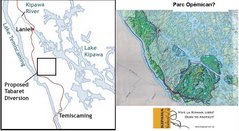
If Hydro Quebec is not actively pursuing Tabaret what is that bite out of Opemican for?
Kipawa Dam: After

Laniel Dam at 2006 Rally
Where is the Kipawa
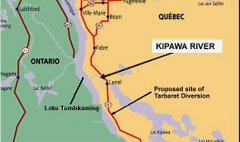
Kipawa flows into lake Temiskamingue, running from Kipawa Lake, under hwy 101 in Quebec
Kipawa Dam

laniel dam at 2004 River Rally
Tabaret is a Bad Idea
About the Kipawa
The best thing paddlers can do to help the cause of the Kipawa:
1. attend the rally and bring others including non paddlers to attend and buy beer and have fun
2. write your MP /MNA and raise the issue and post your objections -1 letter = 200 who didn't write
3. Write Thierry Vandal the CEO of Hydro Quebec strongly opposing the 132 MW standard decrying the use of "diversion" as the most environmentally inappropriate method of power production
4. Write Jean Charest, Premier of Quebec protesting that either the algonquin or the tabaret project will eliminate all other values on the Kipawa River by turning it into a dry gulch.
5. See if you can get other allied groups interested by showing your own interest, ie the Sierra Defense Fund, Earthwild, MEC, and so on.
6. Demand further consultation
7. Currently we are at the point where we need to sway public opinion and raise awareness.
However, if all else fails, don't get mad, simply disrupt, foment, and protest . The Monkey Wrench Gang.
Have you read Edward Abbey?
Important Addresses
CEO,Hydro Québec, 75 boul René Levesque, Montreal, P.Q., H2Z 1A4Caille.andre@hydro.qc.ca
The best thing paddlers can do to help the cause of the Kipawa:
1. attend the rally and bring others including non paddlers to attend and buy beer and have fun
2. write your MP /MNA and raise the issue and post your objections -1 letter = 200 who didn't write
3. Write Thierry Vandal the CEO of Hydro Quebec strongly opposing the 132 MW standard decrying the use of "diversion" as the most environmentally inappropriate method of power production
4. Write Jean Charest, Premier of Quebec protesting that either the algonquin or the tabaret project will eliminate all other values on the Kipawa River by turning it into a dry gulch.
5. See if you can get other allied groups interested by showing your own interest, ie the Sierra Defense Fund, Earthwild, MEC, and so on.
6. Demand further consultation
7. Currently we are at the point where we need to sway public opinion and raise awareness.
However, if all else fails, don't get mad, simply disrupt, foment, and protest . The Monkey Wrench Gang.
Have you read Edward Abbey?
Important Addresses
CEO,Hydro Québec, 75 boul René Levesque, Montreal, P.Q., H2Z 1A4Caille.andre@hydro.qc.ca
Tabaret is a Bad Idea (Part Two)
Les Amis de la Riviere Kipawa is poised to use an application to the Federal Court to issue a Writ of Mandamus to ensure the Minster does what he is supposed to do, protect the public's right to navigate the water control structure at Laniel, Quebec using the Navigable Waters Protection Act. (see http://www.kipawariver.ca/)
In the now gutted Navigable Waters Protection Act lay the means by which the Minister of Transport could keep the public right of passage down our great Canadian Heritage, our rivers and streams which are threatened especially by resource corporations and power brokers such as Hydro Quebec.
These powerful entities continue to petition that 'this' river or 'that' stream is not navigable and therefore not protectable.
I don't say that dams and bridges should not be built, only that if they are, historical navigation rights should be considered and preserved by making reasonable accommodations for recreational boaters.
It is the Minister of Transport, in exercising the right to allow or disallow work on or over a navigable waterway is what keeps boats and recreational boaters plying our waterways.
To many recent cases launched in the Federal Court concerning the Navigable Waters Protection Act, most recently the case of the Humber Environment Group of Cornerbrook Newfoundland versus the Cornerbrook Pulp and Paper Company indicates that the important oversight is not being faithfully performed. Have we really come to the point now where we must say "such and such a stream is one foot deep, possessing so many cubic feet per second flow and so on?" The answer to this is... YES!
The honourable Mr. Justice John A. O'Keefe, ruled that it had not been shown that the river was navigable. How convenient was that to the Minister? But either the Minister of Transport acts to protect our rivers and streams as a public right or he does not and that means rivers and streams currently enjoyed by kayakers and canoists.
Enough of the cheating, and double-talk. Canadians! our rivers and streams are our own, lets urge the Minister of Transport and the our government to protect them.
Peter Karwacki
In the now gutted Navigable Waters Protection Act lay the means by which the Minister of Transport could keep the public right of passage down our great Canadian Heritage, our rivers and streams which are threatened especially by resource corporations and power brokers such as Hydro Quebec.
These powerful entities continue to petition that 'this' river or 'that' stream is not navigable and therefore not protectable.
I don't say that dams and bridges should not be built, only that if they are, historical navigation rights should be considered and preserved by making reasonable accommodations for recreational boaters.
It is the Minister of Transport, in exercising the right to allow or disallow work on or over a navigable waterway is what keeps boats and recreational boaters plying our waterways.
To many recent cases launched in the Federal Court concerning the Navigable Waters Protection Act, most recently the case of the Humber Environment Group of Cornerbrook Newfoundland versus the Cornerbrook Pulp and Paper Company indicates that the important oversight is not being faithfully performed. Have we really come to the point now where we must say "such and such a stream is one foot deep, possessing so many cubic feet per second flow and so on?" The answer to this is... YES!
The honourable Mr. Justice John A. O'Keefe, ruled that it had not been shown that the river was navigable. How convenient was that to the Minister? But either the Minister of Transport acts to protect our rivers and streams as a public right or he does not and that means rivers and streams currently enjoyed by kayakers and canoists.
Enough of the cheating, and double-talk. Canadians! our rivers and streams are our own, lets urge the Minister of Transport and the our government to protect them.
Peter Karwacki
Tabaret is a Bad Idea (Part Three)
10 Reasons WhyTabaret is a Bad Idea1) Tabaret is too big. The station is designed to useevery drop of water available in the Kipawawatershed, but will run at only 44 percent capacity.We believe the Tabaret station is designed to usewater diverted from the Dumoine River into theKipawa watershed in the future.
2) The Tabaret project will eliminate the aquaticecosystem of the Kipawa River.The Tabaret project plan involves the diversion of a16-km section of the Kipawa River from its naturalstreambed into a new man-made outflow from LakeKipawa.
3) Tabaret will leave a large industrial footprint on thelandscape that will impact existing tourismoperations and eliminate future tourism potential.
4) The Tabaret project is an aggressive single-purposedevelopment, designed to maximize powergeneration at the expense of all other uses.
5) River-diversion, such as the Tabaret project, takinglarge amounts of water out of a river’s naturalstreambed and moving it to another place, is verydestructive to the natural environment.
6) The Kipawa River has been designated a protectedgreenspace in the region with severe limitations ondevelopment. This designation recognizes theecological, historical and natural heritage value ofthe river and the importance of protecting it.Tabaret will eliminate that value.
7) If necessary, there are other, smarter and morereasonable options for producing hydro power onthe Kipawa watershed. It is possible to build a lowimpactgenerating station on the Kipawa river, andmanage it as a “run-of-the-river” station, makinguse of natural flows while maintaining other values,with minimal impact on the environment.
8) The Kipawa watershed is a rich natural resource forthe Temiscaming Region, resonably close to largeurban areas, with huge untapped potential fortourism and recreation development in the future.Tabaret will severely reduce this potential.
9) Tabaret provides zero long-term economic benefitfor the region through employment. The plan is forthe station to be completely automated andremotely operated.
10) The Kipawa River is 12,000 years old. The riverwas here thousands of years before any peoplecame to the region. The Tabaret project will change all that.
Problems on a local River?
- There is more to do as well but you have to do your research and above all, don't give up.
- IN the meantime prepared a document itemizing the history of navigation of this spot and its recreational value. Use the Kipawa river history of navigation as a guide: see www.kipawariver.ca
- Under the Ministry of Environment guidelines you have a set period of time to petition the change under the environmental bill of rights, you may have limited time to take this action. But it involves going to court for a judicial review of the decision.
- 4. contact the ministry of natural resources officials and do the same thing.
- 3. contact the ministry of the environment and determine if they approved the project
- 2. determine if the dam was a legal dam, approved under the navigable waters protection act.
- 1. research the decision and timing of it to determine if an environmental assessment was done.
Minden Ontario
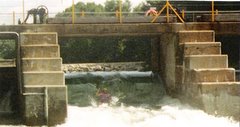
Gull River Water control at Horseshoe lake
A History of Navigation on the Kipawa River
Prior to the environmental assessment there was no signage at the Laniel Dam
T-Shirts Area: These are available now!

Send $25 and a stamped self addressed envelop for the Tshirt, and for the bumper sticker, a stamped and self addressed envelope with $5.00 for the bumper sticker to Les Amis de la rivière Kipawa, 80 Ontario St., Ottawa, Ontario, K1K 1K9 or click the link To purchase a Les Amis "T" contact Doug with the following information: Number of shirts:Sizes: Ship to Address: Method of Payment: cash, cheque and paypal, Shipto address:
Bumper Stickers Now Available

Get your bumper sticker and show your support for the Kipawa Legal Fund ! - send $5.00 in a Stamped, self addressed envelope to: Peter Karwacki Box 39111, Ottawa, Ontario, Canada, K1H 7X0

